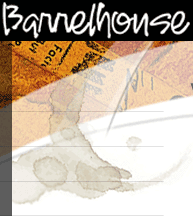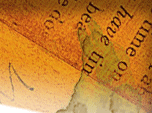|
|
 |
 |

by Joe Killiany
January 1st is the perfect day for TV marathons. I decided that five weeks ago while lying on my couch flipping through cable looking for something to occupy my time. Granted, there were some decent cable offerings, but on a day like New Years, when I wanted to expend as little energy as possible the prospect of switching channels every half hour made me anxious. I didn't want to worry about where I was going to flip next, or whether or not there'd be something worth flipping to, or, if, horror of horrors, I'd be stuck watching a poorly edited version of Ferris Buller's Day Off for the 118th time. So, with this in mind and a hangover in tow, I turned to the 36-hour Twilight Zone marathon thoughtfully provided by the Sc-Fi Channel.
As a child, I loved episodic, black and white, mystery/horror-based television shows. They appealed to my overdeveloped sense of nostalgia (even for times I hadn't lived through). The absolute oldness of those programs -- The Twilight Zone, The Outer Limits, Alfred Hitchcock Presents, etc. -- the graininess of the film, the style of clothing worn by the characters, not only made them cool, but added a sense of both distance and reality to the events depicted. For me, it made sense that characters from the not-so-distant past were more likely to experience terrifying, supernatural occurrences because science hadn't yet explained away all of our everyday mysticisms. In the forties and fifties, odd things could still happen to average people. Aliens hovered over Earth in disc-shaped ships waiting to take over our bodies. My becoming the last man on the planet was only a well-designed vault and a misdirected Russian H-bomb away.
The Twilight Zone was my favorite of these shows. My reasons were myriad, but started with my mother, a woman who also had an affinity for sci-fi TV. She introduced me to the Zone and we often watched it together on Nick at Nite. Secondly, Rod Serling, the series' creator and principle writer, grew up in a town only an hour north of and very similar to the one where I was raised. The resonance of small town life in the Northeast U.S. rings through many of the show's best episodes, which made their events especially relevant to me as a ten year old. And finally, the overall strength of the show spoke for itself. Powerful writing, wonderful stories, and solid acting blended together for a fantastic viewing experience. The show was utterly original; every episode took me down a different path leading to God knew what new terror.
At least that's how I remembered it. But, in watching twelve hours worth of episodes over the course of two days I realized a lot of the Zone wasn't as wonderful or skillfully executed as I remembered. In fact, some episodes downright sucked.
Don't get me wrong, the great ones are exemplary pieces of television stemming from the strongest half-hour teleplays ever penned, their stories achieving near tragic status. Time Enough at Last starring Burgess Meredith, Eye of the Beholder with Joanna Hayes, and Nightmare at 20,000 Feet starring a pre-Kirk William Shatner all delivered wry social commentary and intelligent scares. Plus, the heightened sensitivity of the writing made the characters inhabiting these stories wildly sympathetic.
And that's why we remember these episodes.
But what about The Mirror, starring, of all people, Peter Falk, as a Castro-esque dictator who is given a mirror in which he sees the reflection of the men who will eventually kill him? Doesn't ring a bell, does it? How about Penny for Your Thoughts, with good ole' Dick York playing a mild-mannered pencil pusher temporarily granted the ability to read the minds of those around him? (He uses it to get a promotion and a girl. Good choices, Dick.)
Also, in re-watching a bunch of episodes back to back, it's evident that most re-spin the same ideas. In fact, almost all of the Zones can be broken down into three thematic categories: intense fear of “the other” (Nightmare), the last man on Earth, (Time Enough and the epochal series premiere Where is Everybody?), and reflections on a happy childhood during a disappointing/depressing adulthood, or the flipside, past misdeeds leading to comeuppance, often of a supernatural nature (The Mirror). Granted, a few episodes stand outside these groupings (for instance, Penny and Nick of Time, an episode from season two, starring Shatner as a man obsessed with a fortune telling machine, both have aspects of the third category, but not enough to warrant inclusion) but they cover the lion's share.
However, even after I realized that one of the very things that had fostered my sense of nostalgia had now fallen victim to it, I couldn't stop watching the marathon. I kept wondering if the next episode would be Deaths-Head Revisited starring Oscar Beregi, and whether or not his trial conducted by ghosts of people who had fallen victim to him during the Holocaust would still freak me out. (It did.) Or if the eerie ending of To Serve Man would keep me from sleeping for a week like it did the first time I saw it. (It didn't.) Besides, even the episodes that aren't top notch can offer lessons in the proper construction of stories. This was especially refreshing in an age when Reality TV and reheated sitcom salad use shock and easy laughs to the detriment of craft and character.
Obviously I can't fault the show for not being as perfect as I remembered; how much of what we loved in childhood ever is? In some ways, it's encouraging. That I now have different taste is a nice benchmark to measure how significantly I've changed. But, just knowing I still feel the urge to follow Rod Serling when he invites me into “a dimension not only of sight and of sound but of mind” is a comfortable reminder of where I came from. And it's nice to know that with the flip of a button there are certain days of the year when I can go back there, albeit for a brief time, all of which has to be spent in The Twilight Zone.

|
|
|




